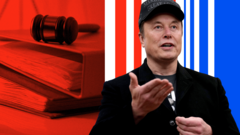Elon Musk, in a surprise appearance at the White House, has taken center stage in a new initiative dubbed the Department of Government Efficiency (Doge), created through an executive order by President Donald Trump. This body is charged with the ambitious goal of slashing federal jobs and curtailing government spending, activities Musk believes are essential to eradicating wasteful taxpayer expenditure. However, Doge's establishment has not been without obstacles, including legal challenges and accusations of conflicts of interest.
Defending his controversial plans, Musk faced reporters in the Oval Office, dismissing claims from rival Democrats who allege that he represents a "hostile takeover" of the government. Polling data reveals a surprising level of public support for spending cuts, although this is juxtaposed with mounting criticism from various quarters.
Doge, despite its bureaucratic aspirations, is not formally recognized as a government department since it was not established through Congressional legislation. As an advisory body, it has a handful of staff members assigned to different government agencies and operates under a mandate to pursue IT reforms aimed at efficiency improvement, with a work deadline set for July 2026.
Musk's team primarily comprises young professionals with technical backgrounds, though the integrity of some employees has recently come into question. Notably, one employee resigned following allegations tied to a racist social media account, a move Musk has vowed to reverse by rehiring them.
Though Musk initially claimed he would serve as a volunteer, he is recognized as an unpaid special government employee, a designation that allows him to operate within the government for up to 130 days annually. Some supporters view this outsider status as beneficial, believing that a lack of adherence to traditional bureaucratic procedures provides Doge a unique advantage.
Musk's declared objective is to save taxpayers significant sums, with estimates initially ranging as high as $2 trillion annually; however, he has since tempered those expectations. Supporters and critics alike hold differing views on the types of agencies Doge will target in its cost-cutting initiatives, with accusations that it leans toward agencies that do not align with Musk's political views.
As Doge progresses, the body has made a number of claims about its financial impact, frequently celebrating what it cites as cuts made under its purview. Some emblematic actions include attempts to minimize "woke" policies, potential downsizing of USAID, and efforts to control the Consumer Financial Protection Bureau, among others.
Public sentiment around Doge has been mixed yet predominantly supportive, especially among the Republican base, according to a recent CBS News poll. While many view Musk's endeavors as essential given the current federal workforce size, opposition remains vocal. Critics argue that transparency is lacking and accuse Musk of overstepping his bounds as an unelected official. Legal challenges have been mounted against Doge's operations, with lawsuits citing potential violations of earlier appropriations.
Despite these headwinds, Musk insists that his reforms reflect a common-sense approach desired by voters. Yet, expert opinions warn that his ambitious goals for cost-cutting bring numerous practical challenges, with administrative necessities deeply embedded in existing programs. Democratic opposition and ongoing litigation imply that the future of Doge and Musk’s broader governmental ambitions will remain contentious topics moving forward.
Defending his controversial plans, Musk faced reporters in the Oval Office, dismissing claims from rival Democrats who allege that he represents a "hostile takeover" of the government. Polling data reveals a surprising level of public support for spending cuts, although this is juxtaposed with mounting criticism from various quarters.
Doge, despite its bureaucratic aspirations, is not formally recognized as a government department since it was not established through Congressional legislation. As an advisory body, it has a handful of staff members assigned to different government agencies and operates under a mandate to pursue IT reforms aimed at efficiency improvement, with a work deadline set for July 2026.
Musk's team primarily comprises young professionals with technical backgrounds, though the integrity of some employees has recently come into question. Notably, one employee resigned following allegations tied to a racist social media account, a move Musk has vowed to reverse by rehiring them.
Though Musk initially claimed he would serve as a volunteer, he is recognized as an unpaid special government employee, a designation that allows him to operate within the government for up to 130 days annually. Some supporters view this outsider status as beneficial, believing that a lack of adherence to traditional bureaucratic procedures provides Doge a unique advantage.
Musk's declared objective is to save taxpayers significant sums, with estimates initially ranging as high as $2 trillion annually; however, he has since tempered those expectations. Supporters and critics alike hold differing views on the types of agencies Doge will target in its cost-cutting initiatives, with accusations that it leans toward agencies that do not align with Musk's political views.
As Doge progresses, the body has made a number of claims about its financial impact, frequently celebrating what it cites as cuts made under its purview. Some emblematic actions include attempts to minimize "woke" policies, potential downsizing of USAID, and efforts to control the Consumer Financial Protection Bureau, among others.
Public sentiment around Doge has been mixed yet predominantly supportive, especially among the Republican base, according to a recent CBS News poll. While many view Musk's endeavors as essential given the current federal workforce size, opposition remains vocal. Critics argue that transparency is lacking and accuse Musk of overstepping his bounds as an unelected official. Legal challenges have been mounted against Doge's operations, with lawsuits citing potential violations of earlier appropriations.
Despite these headwinds, Musk insists that his reforms reflect a common-sense approach desired by voters. Yet, expert opinions warn that his ambitious goals for cost-cutting bring numerous practical challenges, with administrative necessities deeply embedded in existing programs. Democratic opposition and ongoing litigation imply that the future of Doge and Musk’s broader governmental ambitions will remain contentious topics moving forward.




















